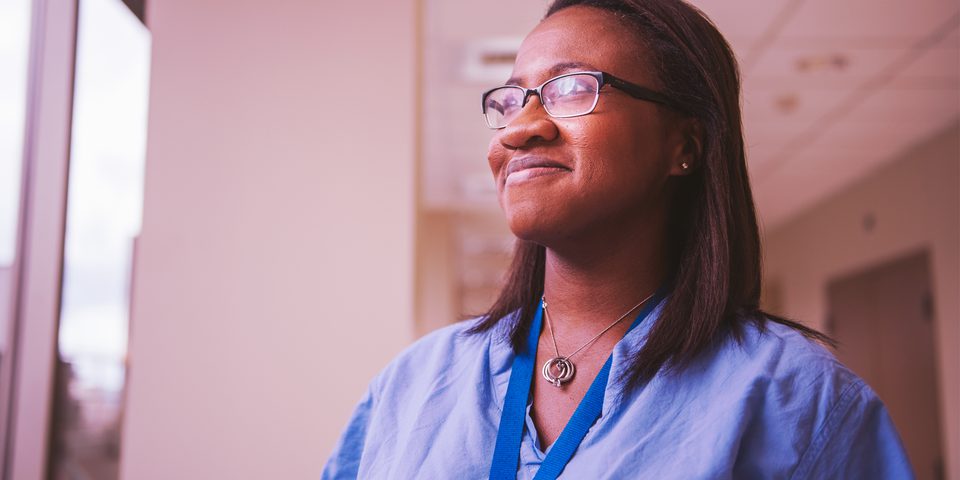Dr. Mary Ackenbom: Promoting Post-Surgical Wellness

From domestic violence to memory loss, surgeon focuses on women’s wellness
Although Dr. Mary Ackenbom is a surgeon, her concern for the wellness of the women she treats — and her curiosity about the way the human body works — don’t end when her patients return home from a successful procedure.
That’s why Dr. Ackenbom, who treats pelvic floor disorders, began screening patients for domestic violence. And after labor and delivery, she promoted the concept of a universal debriefing of all members on the team, with the idea that they could better open lines of communication and get all disciplines on the same page.
And it’s why, after noticing a handful of patients were struggling cognitively after surgery, she is now studying how procedures could potentially impact memory.
“My central goal with the research that I’m involved in is to improve the quality of care that women are receiving and increase awareness of what is being provided for women,” she says.
Originally a finance major as an undergraduate, Dr. Ackenbom had an epiphany her junior year while reflecting on what she really wanted to do with her life. She’d always been drawn to medicine and life sciences, and she also had a lifelong passion for working with people.
“I found myself realizing that the reward and the feeling of giving back to people was driving enough for me to make that leap,” she recalls.
In medical school, the OB/GYN rotation allowed her to work as a surgeon while still forming relationships with her patients. And in her subspecialty of urogynecology, she saw that her work could truly impact a woman’s quality of life.
She was drawn to Magee-Womens Research Institute by the opportunity to conduct research that she could then directly translate to the clinical care she gave. It’s a decision she does not regret.
“Everything was even better than I imagined,” she says.
For four years during medical school, Dr. Ackenbom served as a sexual assault advocate in her free time.
“The experience was very rewarding, and I gained a lot of insight through those experiences that I took on as a clinician,” she says.
In the subspecialty of pelvic floor disorders, she found a link between physical or sexual violence and patient reports of pelvic pain. A question about violence to the medical and social history of new patients led to nearly 12 percent of 1,000 patients disclosing that they had experienced abuse. It was a link that increased awareness of an important issue in this population of women.
Her study of post-operative cognitive impairment stemmed from clinical cases in which family members reported that patients were not as mentally sharp or were forgetting to take medication since their surgeries.
“We know anecdotally that anesthesia and the surgical experience can potentially have an effect on memory,” Dr. Ackenbom says. She has received funding from the Audrey Hillman Fisher Foundation and the American Urogynecologic Society Pelvic Floor Disorders Research Foundation to support her initial study determining the changes to cognition that occur in older women after undergoing surgery.
The testing revealed cognitive impairment in about 31 percent of the patients measured two weeks after surgery. She proposes to include PET scanning for amyloid plaques, a hallmark of Alzheimer’s disease. A radiotracer that allows scans to image amyloid in a living brain was developed at the University of Pittsburgh.
Dr. Ackenbom theorizes that a patient who already has amyloid plaques might be predisposed to cognitive problems after surgery because of the inflammation that occurs as a result of the procedure.
“Surgery is a controlled trauma,” she points out, and inflammation has been implicated in the development of Alzheimer’s.
The initial cohort using brain imaging will include about 30 women, she says. Eventually, if the study can obtain more funding, Dr. Ackenbom hopes to expand the cohort to 120 women.
“These are elective surgeries, so it’s really important that we understand what could happen as a postoperative complication,” she says. “How can we intervene? Do we need to provide more nursing services? What can we do?”
Be the First to Know
Get the latest research, news, events, and more delivered to your inbox.